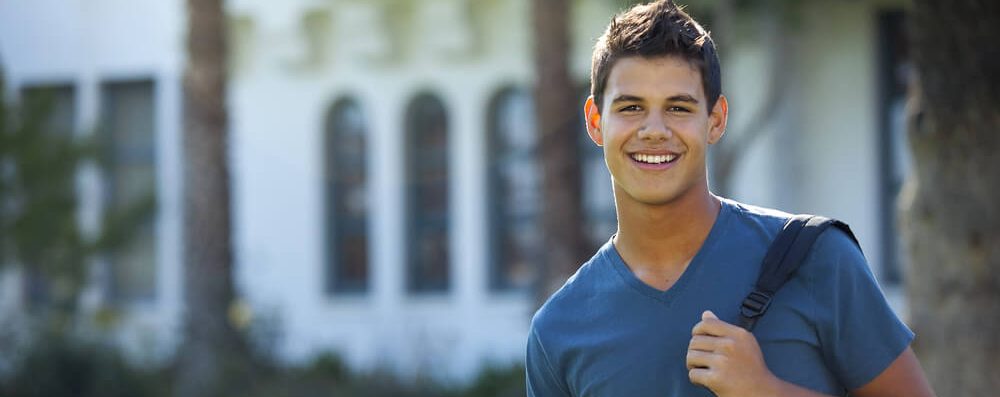Student-centric advice and objective recommendations
Higher education has never been more confusing or expensive. Our goal is to help you navigate the very big decisions related to higher ed with objective information and expert advice. Each piece of content on the site is original, based on extensive research, and reviewed by multiple editors, including a subject matter expert. This ensures that all of our content is up-to-date, useful, accurate, and thorough.
Our reviews and recommendations are based on extensive research, testing, and feedback. We may receive commission from links on our website, but that doesn’t affect our editors’ opinions. Our marketing partners don’t review, approve or endorse our editorial content. It’s accurate to the best of our knowledge when posted. You can find a complete list of our partners here.
How to Become a Teacher Guide
 By
Zach Skillings
By
Zach Skillings 
Zach Skillings is the Scholarships360 Newsletter Editor. He specializes in college admissions and strives to answer important questions about higher education. When he’s not contributing to Scholarships360, Zach writes about travel, music, film, and culture. His work has been published in Our State Magazine, Ladygunn Magazine, The Nocturnal Times, and The Lexington Dispatch. Zach graduated from Elon University with a degree in Cinema and Television Arts.
Full BioLearn about our editorial policies

Maria Geiger is Director of Content at Scholarships360. She is a former online educational technology instructor and adjunct writing instructor. In addition to education reform, Maria’s interests include viewpoint diversity, blended/flipped learning, digital communication, and integrating media/web tools into the curriculum to better facilitate student engagement. Maria earned both a B.A. and an M.A. in English Literature from Monmouth University, an M. Ed. in Education from Monmouth University, and a Virtual Online Teaching Certificate (VOLT) from the University of Pennsylvania.
Full BioLearn about our editorial policies

Someone once said, “teaching is the one profession that creates all other professions,” and that couldn’t be truer. Teachers play one of the most crucial roles in our society, shaping the minds of young people and helping them pursue productive and fulfilling lives.
If you’re wondering how to become a teacher, you’ve come to the right place! The process involves getting your bachelor’s degree, completing a teacher preparation program, and obtaining certification in your state. Keep reading to get the step-by-step breakdown.
1. Determine your teaching preferences
So you’ve decided you want to become a teacher. That’s terrific! The question is – what kind of teacher? Do you want to work with preschoolers and kindergarteners? Do you want to teach at the high school level and specialize in a particular subject like history or math? What about teaching special education students? Ask yourself these questions as you’re narrowing down the type of teaching role you’d like to pursue. Knowing your teaching preferences is crucial to determining the type of education you’re going to need.
2. Get your bachelor’s degree
In most cases, a bachelor’s degree is the minimum qualification needed to become a K-12 teacher in a U.S. school. Although majoring in education is not mandatory, it’s the most common choice for those looking to enter the profession. Even within education, there are various subfields to choose from. The one you decide to pursue will depend on the type of students you want to teach. Below are a few of the most common degree paths within the field of education:
Early childhood education
This degree path is great for anyone looking to teach preschool or kindergarten. The curriculum prepares students to help young children (from their earliest months to age eight) with their social and cognitive development. Early childhood ed degrees are available at every level, all the way from associate to doctorate. An associate degree is the minimum qualification to become a preschool teacher, but sometimes a bachelor’s degree is preferred.
Elementary education
An elementary education degree prepares students to teach from grades one through six, although they may also teach at the kindergarten or middle school level. Course material covers a wide range of subject matter, from math and social studies to reading and art. Students also learn about various teaching methods and strategies.
Secondary education
Secondary education refers to the middle and high school levels, encompassing students aged 12 to 18. Because they instruct older students, secondary education teachers tend to focus on a particular subject such as math, science, history, or English. Students commonly pick up a minor or second major in the subject they plan to teach.
Physical education
A physical education degree prepares students to teach P.E. classes from kindergarten through the end of high school. The curriculum is similar to other teaching degrees, but also includes coursework on physical fitness, motor skill development, physical disabilities, and sports psychology. It’s a great degree for anyone interested in sports and living an active lifestyle.
Special education
Special education involves helping students with physical and mental disabilities. These students often require particular teaching techniques that require additional training and experience. With a degree in special education, teachers can identify students with special needs, create a curriculum that matches those needs, and deliver the academic material in a way the student can understand.
Also see: Top Education scholarships
3. Complete a teacher preparation program
Along with getting your degree, you’ll also need to complete a teacher preparation program (TPP). Many schools offering education degrees combine the TPP into the curriculum. During the TPP, students gain real-world teaching experience. This means you’ll teach students (often in a public school) under the supervision of the classroom teacher. Most of the time, participants spend one or two school semesters engaged in student-teaching. Before beginning the TPP portion of their curriculum, students must pass the Praxis (see description below), meet the GPA requirement, and be in the final year of their program.
Taking the Praxis
The Praxis test is used by many colleges and universities as an entry exam for teacher preparation programs. Many states also require Praxis scores as part of the teacher licensing process. The test, which most students take early in their college career, evaluates academic skills in math, reading, and writing. No matter what subject area or grade level you aspire to teach, taking the Praxis is a necessary part of the process.
4. Become certified/licensed
After earning your degree and completing a TPP, you’ll be ready to apply for your state’s certification. This process typically involves passing a criminal background check and earning sufficient scores on the Praxis test. Requirements may vary slightly depending on where you live, so make sure to check the teacher certification information in your state.
5. Apply for jobs
Now that you’ve made it to this point, it’s time to find work as a teacher. You probably already have a grade level or subject in mind, but there’s other specifics to consider as well. Do you want to work in a public or private school? Urban or suburban? These are just a couple factors to keep in mind. Do research and participate in networking events to determine the schools where you’d like to teach. Once you’ve narrowed it down, start applying!
6. Continue your education
Even after getting hired, there’s still educational requirements to keep up with. Many states require teachers to renew their licenses every few years. During this time, teachers must complete various continuing education or professional development courses. This process ensures that teachers remain at the top of their game. Outside of maintaining state licensure, continuing your education has the potential to advance your career as well. By earning a master’s, EdS or doctorate degree, teachers can move on to become college professors, school administrators, or instructional coordinators.
7. Enjoy the ride!
Teaching is one of the most rewarding professions out there. Not only do you get to have a positive impact on your community, but you also get the chance to form incredible relationships with students, parents, and other teachers along the way. Good luck on your journey!
Financial aid options for teachers
Teachers have a couple of unique options to help them pay for their education. For example, the federal TEACH program can provide up to $4,000 per year for students who commit to teaching in the United States after earning their diploma.
What’s more, there are financial aid resources out there even for teachers who have already graduated. Teachers can qualify for public service loan forgiveness, which forgives federal student loans which they haven’t paid back after ten years of repayment. In addition, teachers can take advantage of general federal aid programs such as the Pell Grant and Stafford Loans.
Additional resources for teachers and education majors
- Top scholarships for teachers
- Top scholarships for education majors
- Scholarships360 guides to college majors
No matter what you major in, make sure that you apply for all the scholarships you qualify for while you are eligible!
Frequently asked questions about how to become a teacher
Do I need a master’s degree in order to become a teacher?
What are some necessary skills for being a teacher?
How can I gain teaching experience before becoming a certified teacher?


